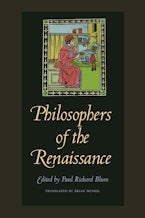- Home
- philosophy
- Philosophers of the Renaissance
Preparing your PDF for download...
There was a problem with your download, please contact the server administrator.
Philosophers of the Renaissance
Edited by Paul Richard Blum
Translated by Brian McNeil
Imprint: Catholic University of America Press
Philosophers of the Renaissance introduces readers to philosophical thinking from the end of the Middle Ages through the sixteenth century. International specialists portray the thought of twenty-one individual philosophers, illustrating their life and work and highlighting the importance of their thinking.
Best known among the personalities discussed are Nicholas of Cusa, who combined mathematics with theology; Pico della Mirandola, the first to introduce Hebrew wisdom; Marsilio Ficino, who made the works of Plato accessible to his contemporaries; Pietro Pomponazzi, who challenged the Church with unorthodox teachings; and Tommaso Campanella, who revolutionized philosophy and science while imprisoned.
Philosophers of this period explored a great variety of human knowledge: Greek scholars who had emigrated from Byzantium spread ancient and patristic learning; humanists applied their skills to art, architecture, and the text of the Bible (Leon Battista Alberti and Lorenzo Valla); some debated about methods of scientific research — always with religion in their mind (Raymond Lull, Agrippa of Nettesheim, Philipp Melanchthon, Petrus Ramus, Bernardino Telesio, Jacopo Zabarella); others pondered the ethical implications (Michel de Montaigne, Luis Vives); or they confronted a radical overturn of the traditional worldview (Francesco Patrizi, Giordano Bruno, Francisco Suárez).
The book weaves together the stories of these thinkers by emphasizing the unity of Renaissance philosophy in its attempt to find a philosophical method, combine religious and political thought, analyze language, and discuss the practical dimension of philosophy. Originally published in German in 1998, the chapters have been thoroughly revised and updated. A chapter on Luis Vives was written specifically for this English edition; an extensive bibliography introduces the reader to the current research on philosophers of the Renaissance.
Paul Richard Blum is T. J. Higgins, S.J., Chair in Philosophy at Loyola University Maryland. The author or editor of eighteen books, Blum is internationally recognized as an eminent authority on the Renaissance.
"Perfect miniatures by well-informed historians of philosophy. Those who are looking for a comprehensive picture of the Renaissance will not find a better book."
~Die Tagespost
"Easily accessible to readers new to Renaissance philosophy, this book illustrates a period of transition that is made evident through individual biographies."
~Theologische Revue
"The writing is lively and engaging. This very useful guide is particularly valuable because of its inclusion of figures often slighted by surveys of Renaissance Philosophy... It serves to highlight the broad diversity of Renaissance philosophical interests, ranging from ethics, metaphysics, and epistemology to science, history, language, religion, painting, architecture, and poetry... Highly recommended."
~Choice
"This collection of essays on Renaissance philosophers from 13th-17th centuries seeks a different theme from the traditional humanism of scholars like Paul Oskar Kristeller, Hans Baron, Felix Gilbert, Myron Gilmore… The text is interspersed necessarily with Latin words and phrases, but every author writes with clarity so that even a general reader will understand the arguments."
~Daniel W. Hollis, III, Journal of Interdisciplinary Studies
"This is an impressive collection. All of the chapters are clearly written and offer concise presentations of the philosophical outlook of the philosophers covered… Without question, this volume establishes itself as an outstanding guide to an important and often neglected period of the history of philosophy."
~M.V. Dougherty, The Thomist




